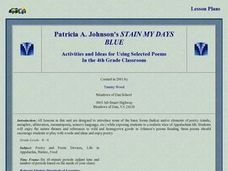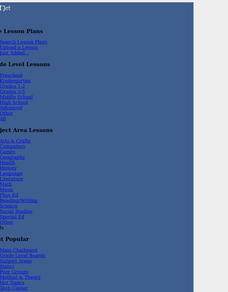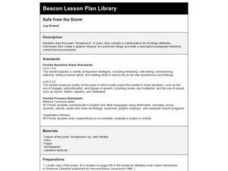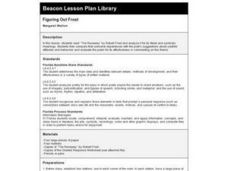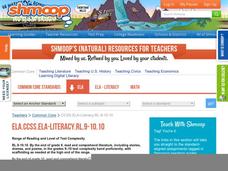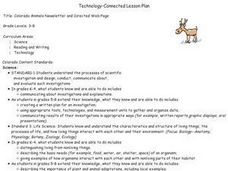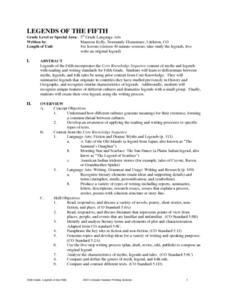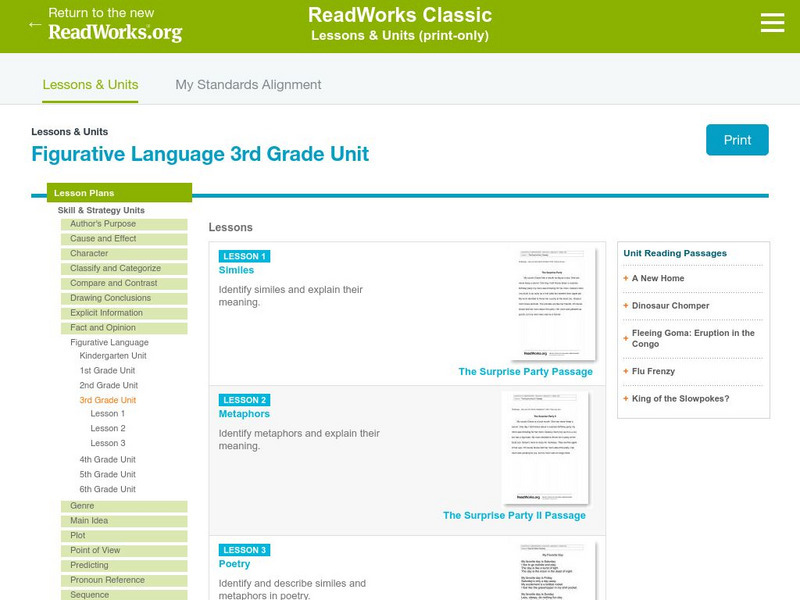Curated OER
Stain My Days Blue
Students read several poems related to the life and culture of the Appalachia region. They are introduced to the poetic forms of simile, alliteration and onomatopoeia and respond to the poems through journal entries and poetry of their own.
Curated OER
Ode to a Nightingale
Pupils read poems about Tuberculosis by John Keats. Using the poems, they identify similies, metaphors, personification and imagery. In groups, they make connections about the author's outlook on life and how his disease impacted his...
Curated OER
Figurative Language Scavenger Hunt
Eighth graders analyze and interpret figurative language. They listen to some examples of poetry which use figurative language. Then, they divide into groups and attempt to find more examples. Finally, 8th graders write what the poet is...
Curated OER
Octavio Paz
Tenth graders read and analyze the poem, "The Street," by Hispanic author, Octavio Paz. They research the life of Octavio Paz and identify his literary contributions. They complete an online scavenger hunt and create an author map of...
Curated OER
Safe from the Storm
Fourth graders read the poem "Snowbound" after brainstorming what a place of refuge is and why it's needed. They, in pairs, meet and write a list of ten attributes that describe a refuge. They write a paragraph describing the look, feel,...
Curated OER
A Courtin' We Will Go
Students investigate dialect in poetry as an indication of a people's culture in literature. They write a poem about dating in this era.
Curated OER
Figurative Language
Students put poetic interpretations back together to explain the poem. Starting with cliches, students learn what various phrases mean. They analyze words, phrases and levels of meaning.
Curated OER
Fifth Grade Literature: January
Fifth graders examine and analyze various poems by Edward Hersey Richards, Robert Frost, and Emily Dickinson. They explore similes, and write journal entry responses.
Curated OER
Figuring Out Frost
Fourth graders read "The Runaway" by Robert Frost and analyze it for its literal and symbolic meanings. They compare their personal experiences with the poet's suggestions about youthful attitudes and behaviors. Some nice worksheets are...
Curated OER
Haunting Music
Students discover music that was inspired by the spooky and bizarre. In this music of Hector Berlioz and Camille Saint-Saens lesson, students identify elements of music and listen to the Symphonie Fantastique and Danse Macabre. Students...
Shmoop
ELA.CCSS.ELA-Literacy.RL.9-10.10
How do you assess what your pupils have learned over the course of the year? Find out how competent they are at reading and analyzing age-level literature with the ideas presented here. Included in this resource are two suggested...
Curated OER
Imagery and Emily Dickinson
Seventh graders explore imagery, particularly in relation to figurative language.
Curated OER
Original Line or Familiar Find?
High schoolers examine a primary source document from 1684 that includes many of the same lines found in Romeo's speech to Juliet from Shakespeare's Romeo and Juliet. Students compare the texts and discuss authorship during the sixteenth...
Curated OER
Rock & Roll through Literary Terms: An Upbeat Lyrical Adventure
Students participate in a variety of activities surrounding Rock & Roll music, lyrics, drama and visual art and how they all help demonstrate examples of literary terms. They use Rock & Roll as an effective aid to stimulate their...
Curated OER
Colorado Animals Newsletter and Directed Web Page
Students select a Colorado animal, develop a Directed Web page, and research their animal. Each member of the group combine their research and develop a Newsletter.
Curated OER
Recognizing Similies: Fast as a Whip
Students review what they have already learned about similies and begin to engage with similies on a deeper and more abstract level as they create their own.
Curated OER
Alliteration
Learners write and illustrate a sentence which names a letter of the alphabet. The sentence should have subject, verb, describing words, and incorporate alliterative techniques.
Curated OER
Technology-commected Folklife Lesson Plan: Fables
Students discuss ways the stories were alike and different. The teacher demonstrate how to draw a Venn diagram using Microsoft Word. They label the two circles and enter the likenesses and differences on the diagram.
Curated OER
Legends of the Fifth
Fifth graders discover the difference between myths, legends, and folk tales. They summarize legends. They work together to dramatize legends and then create their own legend using the writing process. Handouts and worksheets are included.
Curated OER
Using Scholastic News to Introduce the Net
Third graders log on to the net, type in the address for Scholastic and browse the subjects for the week. They select one area of interest and generate five interesting facts about the article.
Read Works
Read Works: 4th Grade Lesson: Similes and Metaphors
[Free Registration/Login Required] A lesson plan in which students use the book Poetry for Young People: Langston Hughes edited by David Roessel and Arnold Rampersad to learn to identify and understand the use of simile and metaphor in...
Read Works
Read Works: Figurative Language 3rd Grade Unit
[Free Registration/Login Required] In this three-lesson unit, learners use the book If You Hopped Like a Frog by David Schwartz and some additional short texts to learn to identify and understand the use of simile and metaphor in fiction...
ReadWriteThink
Read Write Think: Teaching Poetry Through Riddles
Excellent teaching resource that attempts to teach poetic concepts to middle schoolers by using riddles. Discusses riddles' use of metaphor, simile, and imagery, and relates these concepts to the students' understanding of poetry....
Read Works
Read Works: 3rd Grade Lesson: Poetry
[Free Registration/Login Required] A lesson in which students use two provided poems to learn to identify and understand the use of similes and metaphors in poetry. Lesson includes direct teaching, guided practice, and independent...


